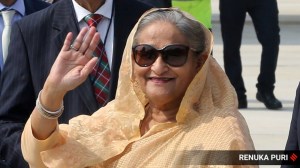Foul air, murky water and a bully pulpit in China
For the bureaucrats in the Chinese Communist Party, a cardinal rule of political self-preservation might be this: better not stand out too m...

For the bureaucrats in the Chinese Communist Party, a cardinal rule of political self-preservation might be this: better not stand out too much, certainly not in public. A government official marching ahead of the parade of acceptable opinion runs the risk of finding himself dangerously alone.
So it is always a surprise to see what comes out when Pan Yue opens his mouth, as he did one afternoon this summer at his office at the State Environmental Protection Administration.
Acid rain, he says, now falls over two-thirds of China’s land mass. Of 340 major cities surveyed last year, 60 per cent had serious air pollution problems. In seven major waterways, pollution is so severe that vast stretches are not suitable for fish.
‘‘Problems that were supposed to be future problems are now problems in the present,’’ warned Pan, 44, as he smoked a cigarette.
If he is blunt in identifying the problems, he sounds almost radical in offering a solution: China must change the way it is developing to prevent an environmental crisis and a depletion of resources.
Environmental protection must become a national priority. And, for good measure, public participation must be encouraged— the sort of language that in China usually means more democracy.
‘‘The pressures China is now facing simply can’t be sustained, the population and resource pressures,’’ Pan said. ‘‘They cannot be ignored.’’
Renowned for years in intellectual circles, the outspoken Pan has become a national figure in a country where environmental awareness is rising, even as environmental degradation is widespread and severe. His job as a Deputy Director of China’s top environmental agency, if low down the totem pole of power in China, has given him a bully pulpit to help put environmentalism on the agenda— apparently with the silent blessing of higher leaders.
Environmentalists in China have long warned that a day of reckoning is coming. A quarter-century of unbridled growth has brought not only new wealth but a legacy of blackened rivers, polluted skies and dwindling natural resources.
But top officials like President Hu Jintao and Prime Minister Wen Jiabao have started talking about the need for environmental protection as part of a ‘‘sustainable development’’ model for the country.
The environmental agency had— in fact, still has— a reputation of being well-intentioned but often powerless. Pan has called for more power for regulators.
‘‘The problem we’re facing is not lack of people,’’ Pan said. ‘‘More important is we need the laws and power to enforce environmental protection. This requires systemic reform.’’ He said public activism and new government policies are essential for China’s future. ‘‘There’s not a third road available to China.”





- 01
- 02
- 03
- 04
- 05


























